
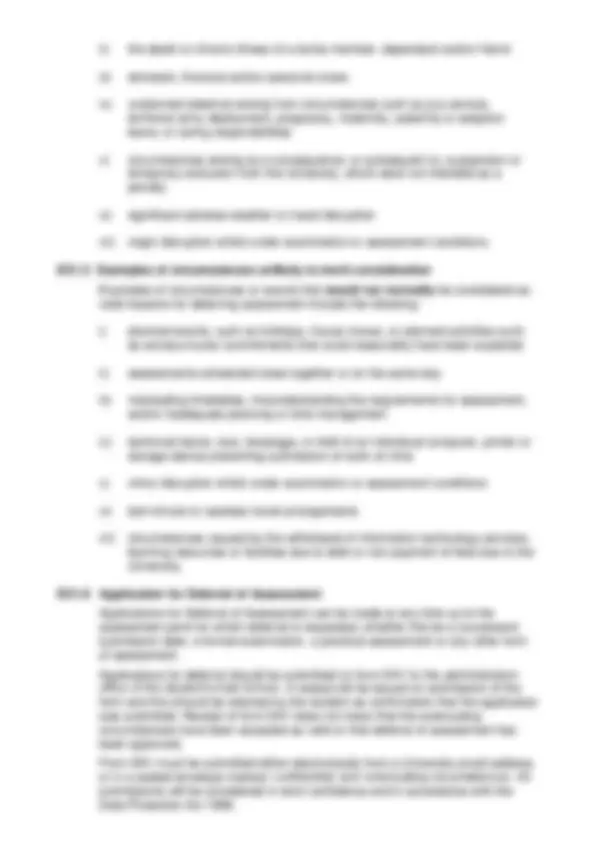
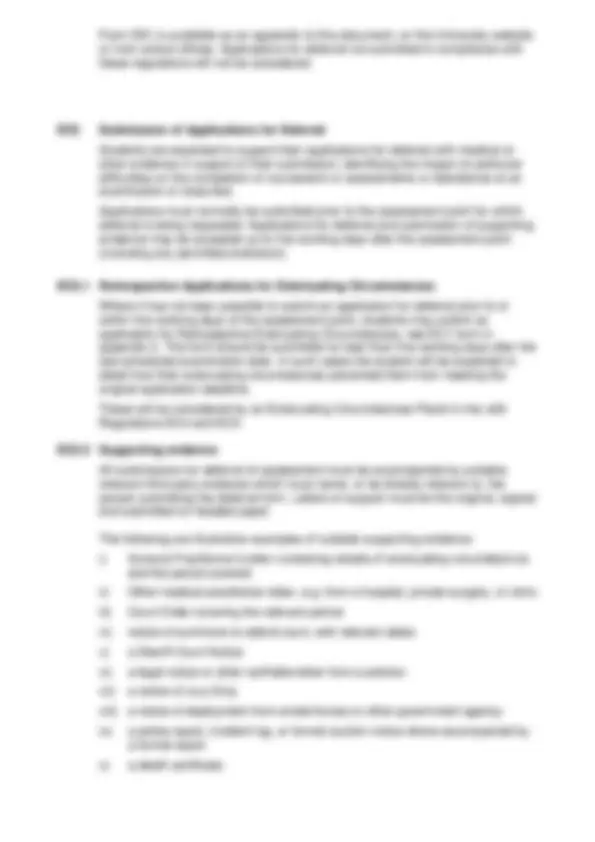
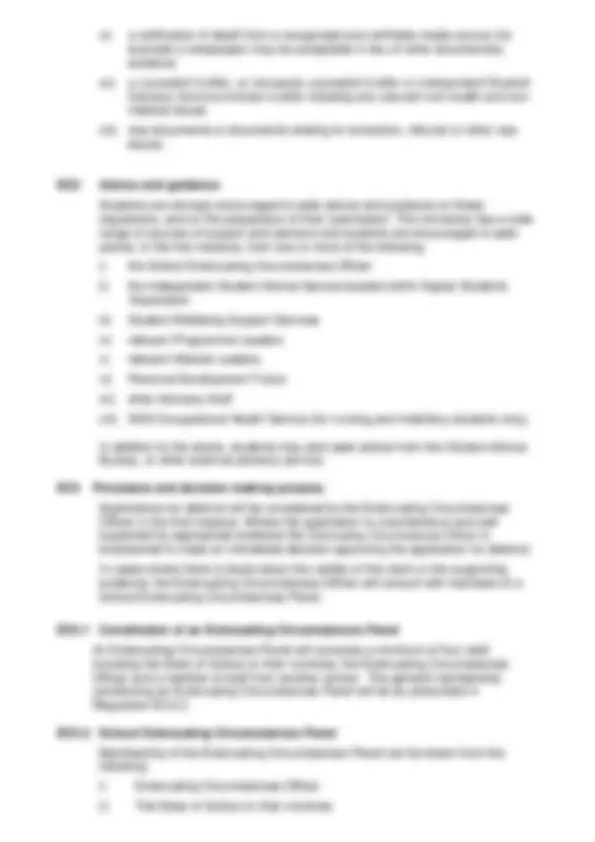
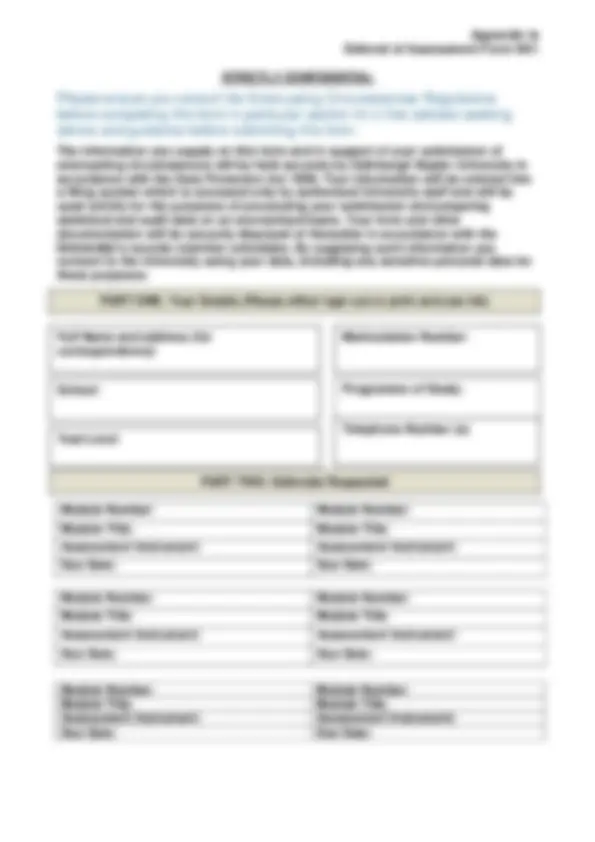
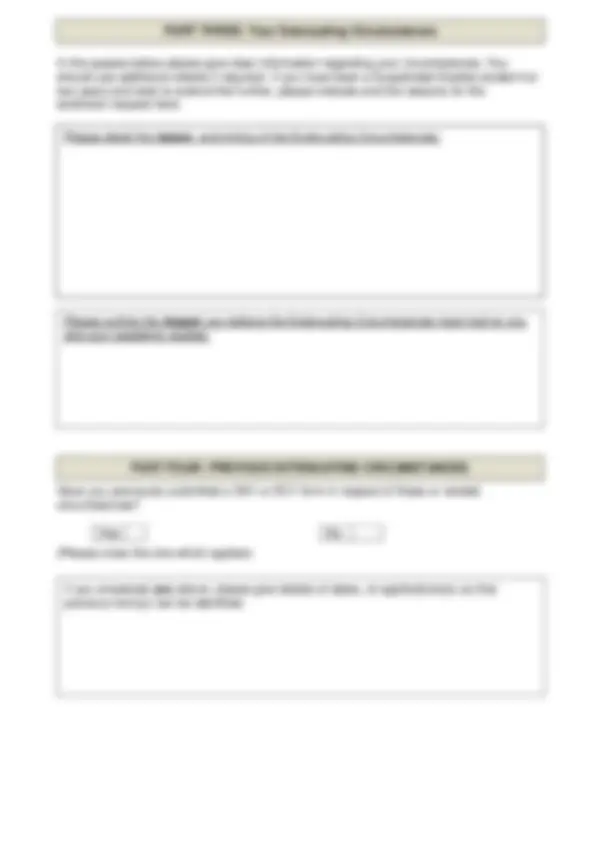
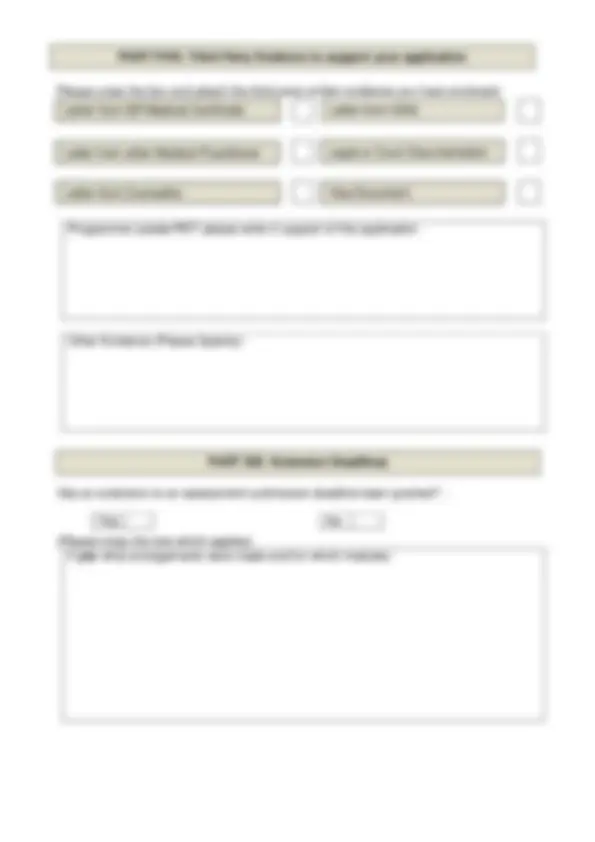
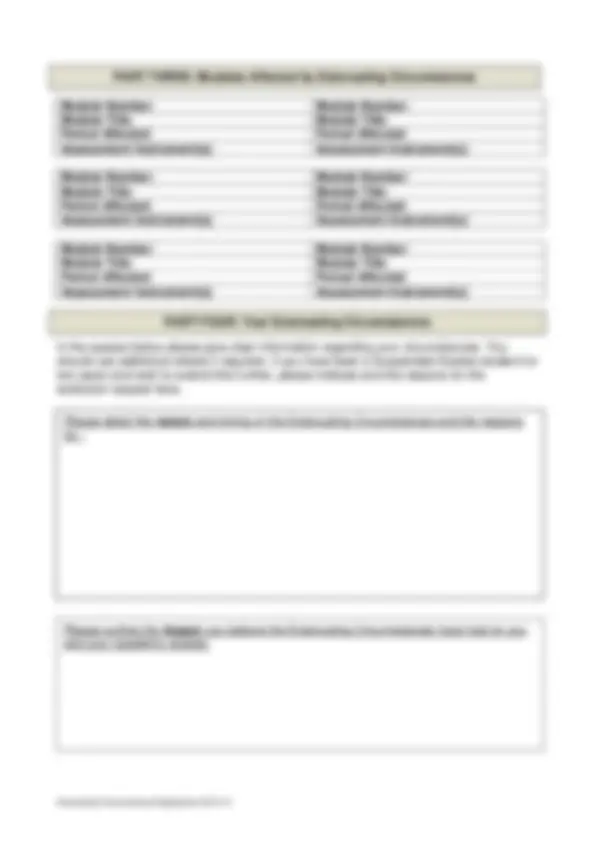
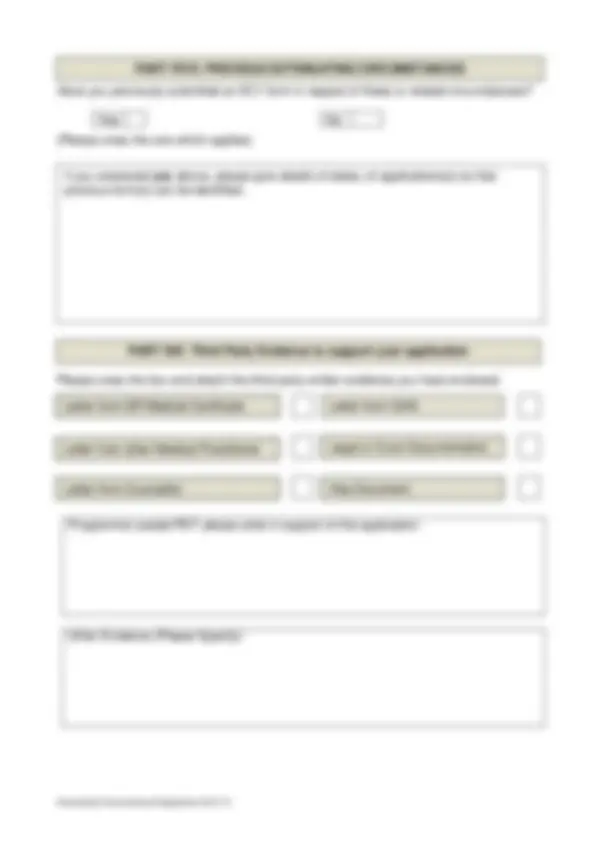
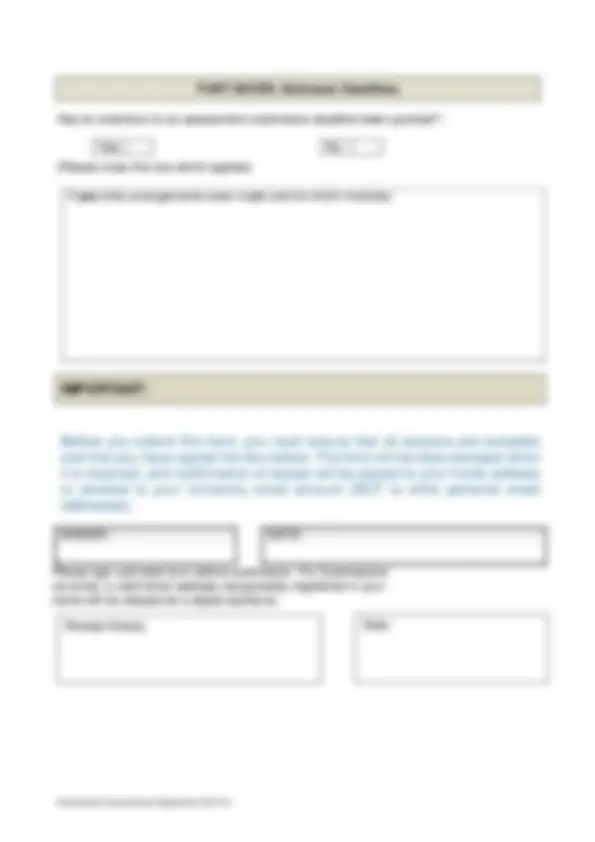
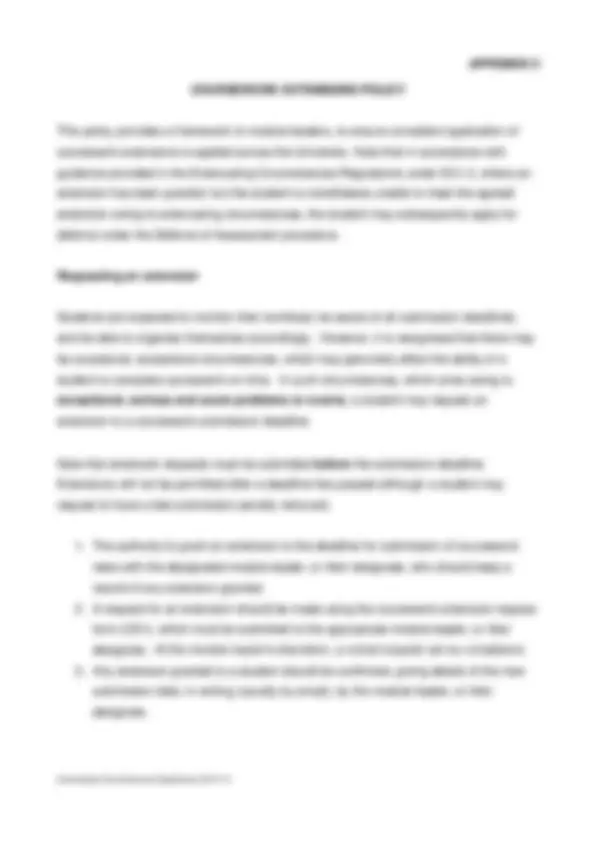
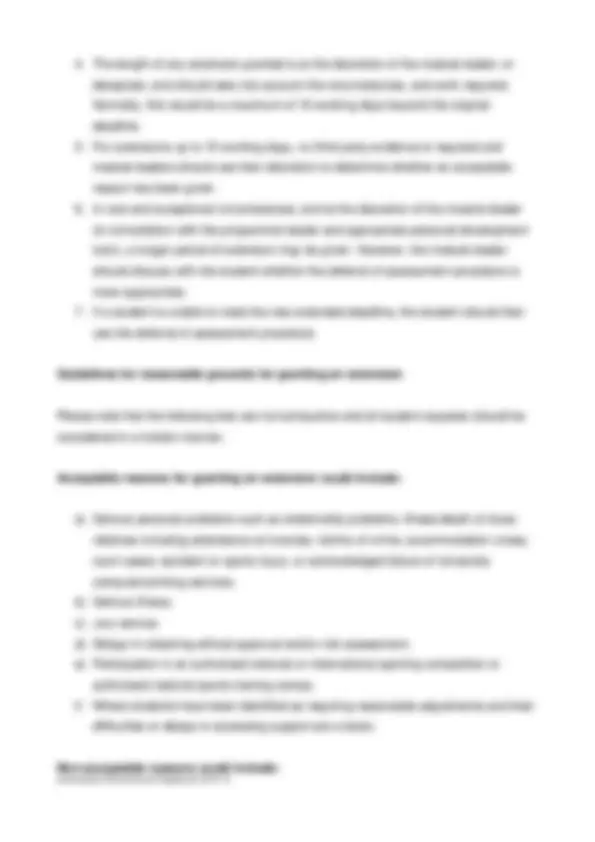
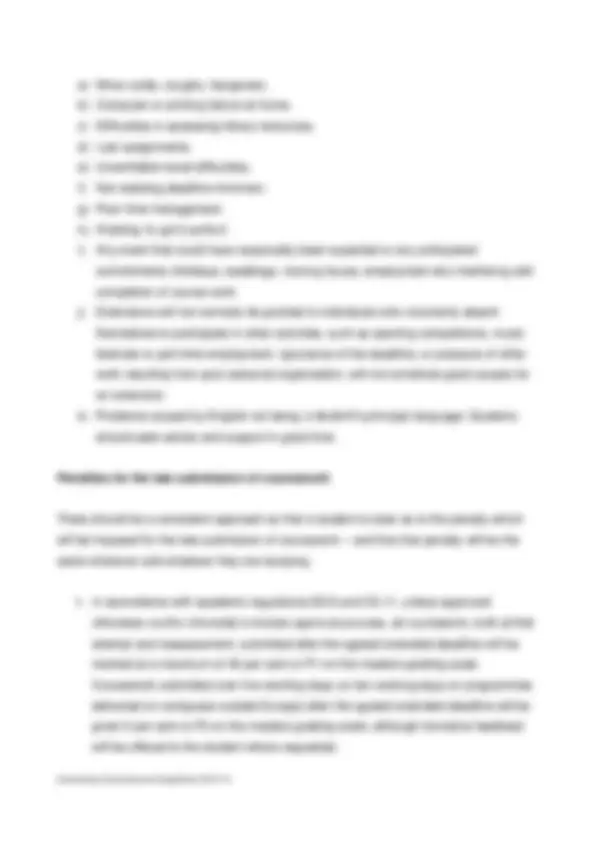
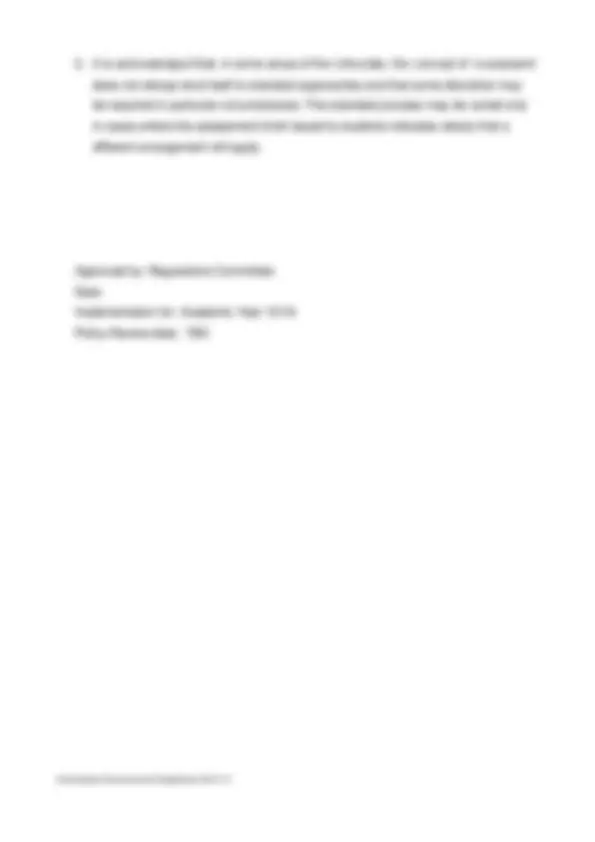
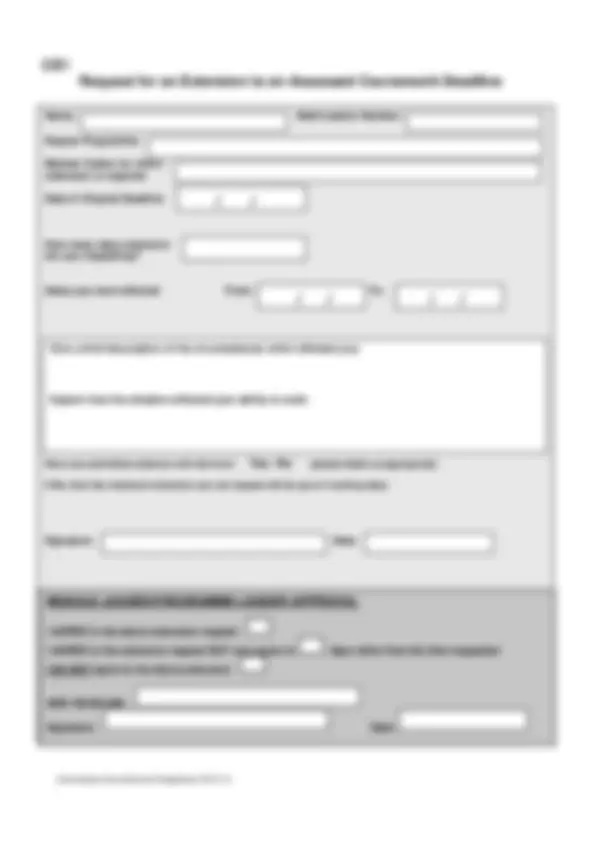


Study with the several resources on Docsity

Earn points by helping other students or get them with a premium plan


Prepare for your exams
Study with the several resources on Docsity

Earn points to download
Earn points by helping other students or get them with a premium plan
Community
Ask the community for help and clear up your study doubts
Discover the best universities in your country according to Docsity users
Free resources
Download our free guides on studying techniques, anxiety management strategies, and thesis advice from Docsity tutors
The regulations and procedures for matriculated students at Edinburgh Napier University who believe their academic progress has been adversely affected by extenuating circumstances. It covers topics such as Fit to Sit principle, types of extenuating circumstances, deferral of assessments, retrospective applications, and the decision-making process of an Extenuating Circumstances Panel. It also includes examples of extenuating circumstances and suitable supporting evidence.
What you will learn
Typology: Study notes
1 / 22

This page cannot be seen from the preview
Don't miss anything!















Contents Page
EC1 Extenuating circumstances
EC1.1 Definition of Extenuating Circumstances
EC1. 2 Fit to Sit 2 EC1. 3 Deferral of Assessment 2 EC1. 4 Examples of Extenuating Circumstances 2 EC1.5 Examples of Circumstances Unlikely to Merit Consideration
EC1.6 Application for Deferral of Assessment 3
EC2 Submission of Applications for Deferral 4 EC2.1 Retrospective Application for Extenuating Circumstances
EC2. 2 Supporting Evidence 4
EC3 Advice and guidance 5
EC4 Extenuating Circumstances Panel 6 EC4.1 Constitution of an Extenuating Circumstances Panel 6 EC4.2 School Extenuating Circumstances Panel 6 EC4.3 Schedule of Meetings 6
EC5 Procedure and decision making process of an Extenuating Circumstances Panel
EC6 Confidentiality 8
EC7 Requests to extend a period of Suspended Studies 8
Appendix Ia: Deferral of Assessment Form DA Appendix Ib: Extenuating Circumstances Form EC Appendix Ic: Flowchart for Retrospective Extenuating Circumstances process Appendix II: Extension Policy
EC1 Extenuating Circumstances
These regulations apply to all matriculated students of Edinburgh Napier University who believe that their ability to complete an assessment of any type has been adversely affected by extenuating circumstances that have had a detrimental effect on their academic studies or progression. All schools will appoint an Extenuating Circumstances Officer, who will be an experienced member of academic or administrative staff, who will administer the Extenuating Circumstances procedure. These regulations should be read in conjunction with the University’s policy on extensions to coursework deadlines which is attached as Appendix 4.
EC1.1 Definition of Extenuating Circumstances
The University considers extenuating circumstances, for the purpose of these regulations, to be exceptional adverse circumstances or events which were unforeseeable or unpreventable, for which the student subject to the circumstances could not take reasonable care to avoid, and which occurred at a significant period within the academic year or trimester
EC1.2 Fit to Sit
The principle of Fit to Sit is that a student who attends, submits or participates in any form of assessment, is declaring him or herself to be in a position to do so and cannot subsequently claim that their performance was adversely affected by extenuating circumstances. The following actions are available where students’ work is compromised by extenuating circumstances: Extension – the student requests an extension to the submission date for coursework, Deferral of Assessment – student is unable to complete assessment at the scheduled time and requests deferral of assessment to the next diet, Retrospective Extenuating Circumstances – where deferral has not been possible the student applies retrospectively for extenuating circumstances to be considered.
EC1.3 Deferral of Assessment
Students who feel that they are unable to attend, submit or participate in any form of assessment, or that their preparation for assessment has been compromised as a result of extenuating circumstances are permitted to defer that assessment to the next assessment diet, subject to approval of an application for Deferral of Assessment. Approved deferrals are reported to the student’s Programme Board of Examiners. Deferral of assessment may have an impact on progression or award decisions.
EC1.4 Examples of Extenuating Circumstances
The following are examples of extenuating circumstances that may adversely affect preparation, attendance or performance in an assessment or examination that may be considered as grounds for deferral of assessment. This is an illustrative but not exhaustive list :
i) serious illness or injury
Form DA1 is available as an appendix to this document, on the University website or from school offices. Applications for deferral not submitted in compliance with these regulations will not be considered.
EC2 Submission of Applications for Deferral
Students are expected to support their applications for deferral with medical or other evidence in support of their submission, identifying the impact of particular difficulties on the completion of coursework or assessments or attendance at an examination or class test. Applications must normally be submitted prior to the assessment point for which deferral is being requested. Applications for deferral and submission of supporting evidence may be accepted up to five working days after the assessment point (including any permitted extension).
EC2.1 Retrospective Applications for Extenuating Circumstances
Where it has not been possible to submit an application for deferral prior to or within five working days of the assessment point, students may submit an application for Retrospective Extenuating Circumstances, see EC1 form in appendix 2. The form should be submitted no later than five working days after the last scheduled examination date. In such cases the student will be expected to detail how their extenuating circumstances prevented them from meeting the original application deadline. These will be considered by an Extenuating Circumstances Panel in line with Regulations EC4 and EC5.
EC2.2 Supporting evidence
All submissions for deferral of assessment must be accompanied by suitable, relevant third party evidence which must name, or be directly relevant to, the person submitting the deferral form. Letters of support must be the original, signed and submitted on headed paper.
The following are illustrative examples of suitable supporting evidence: i) General Practitioner’s letter containing details of extenuating circumstances and the period covered ii) Other medical practitioner letter, e.g. from a hospital, private surgery, or clinic iii) Court Order covering the relevant period iv) notice of summons to attend court, with relevant dates v) a Sheriff Court Notice vi) a legal notice or other verifiable letter from a solicitor vii) a notice of Jury Duty viii) a notice of deployment from armed forces or other government agency ix) a police report, incident log, or formal caution notice where accompanied by a formal report x) a death certificate
xi) a notification of death from a recognised and verifiable media source (for example a newspaper) may be acceptable in lieu of other documentary evidence xii) a counsellor’s letter, or University counsellor’s letter or Independent Student Advisory Services Advisor’s letter detailing any relevant non health and non- medical issues xiii) visa documents or documents relating to revocation, tribunal or other visa issues.
EC3 Advice and guidance
Students are strongly encouraged to seek advice and guidance on these regulations, and on the preparation of their submission. The University has a wide range of sources of support and advisors and students are encouraged to seek advice, in the first instance, from one or more of the following: i) the School Extenuating Circumstances Officer ii) the Independent Student Advice Service located within Napier Students Association iii) Student Wellbeing Support Services iv) relevant Programme Leaders v) relevant Module Leaders vi) Personal Development Tutors vii) other Advisory Staff viii) NHS Occupational Health Service (for nursing and midwifery students only).
In addition to the above, students may also seek advice from the Citizens Advice Bureau, or other external advisory service.
EC4 Procedure and decision making process
Applications for deferral will be considered by the Extenuating Circumstances Officer in the first instance. Where the application is uncontentious and well supported by appropriate evidence the Extenuating Circumstances Officer is empowered to make an immediate decision approving the application for deferral. In cases where there is doubt about the validity of the claim or the supporting evidence, the Extenuating Circumstances Officer will consult with members of a School Extenuating Circumstances Panel.
EC4.1 Constitution of an Extenuating Circumstances Panel
An Extenuating Circumstances Panel will comprise a minimum of four staff, including the Dean of School or their nominee, the Extenuating Circumstances Officer and a member of staff from another school. The general membership constituting an Extenuating Circumstances Panel will be as prescribed in Regulation EC4.2.
EC4.2 School Extenuating Circumstances Panel
Membership of the Extenuating Circumstances Panel can be drawn from the following: i) Extenuating Circumstances Officer ii) The Dean of School or their nominee
Extenuating circumstances that were presented to the Extenuating Circumstances Panel and deemed not valid will not be raised at the Programme Board of Examiners and any assessment not submitted or examination or test not attended will be treated as failed for the purposes of progression or award decisions.
Following the meeting of the Programme Board of Examiners the student’s module record will be updated to indicate if extenuating circumstances were valid and deferral was granted. Information on whether extenuating circumstances have been considered in previous sessions will be flagged on the documentation available to subsequent Programme Boards of Examiners.
Students’ results will outline the consideration of extenuating circumstances by the Extenuating Circumstances Panel and consideration of progression and academic study decisions by the Programme Board of Examiners on their final results.
EC6 Confidentiality
In exceptional circumstances a student may choose to report their circumstances and third party evidence either directly to the convenor of the Extenuating Circumstances Panel or to a nominated member of staff not connected with their programme of study; usually a student counsellor in Student & Academic Services or an advisor in ISAS.
On receipt of such a request, the staff member or counsellor should advise the student of the benefits of disclosing information related to their circumstances, to allow their particular circumstances to be disclosed to the full panel and encourage the student to complete the details requested on forms DA1 or EC1. Students should be made aware that whilst strict confidentiality will be adhered to, the more detail disclosed to the Extenuating Circumstances Panel, the greater the Panel’s ability to take full account of the reasons for their application.
Should a student still not wish to complete key sections of forms DA1 or EC which outline their circumstances, then the counsellor or staff member should make the necessary arrangements for the student to report their circumstances in person and confidentially to the Convenor of the Extenuating Circumstances Panel or their depute.
The Convenor of the Extenuating Circumstances Panel must be satisfied that, in their judgement, the circumstances reported have been properly evidenced to justify their recommendation to the Extenuating Circumstances Panel. The Convenor is responsible for making their recommendation to the Panel for approval and homologation.
EC7 Requests to extend a period of Suspended Studies
The Extenuating Circumstances panel will also be responsible for considering applications for exceptional extension to a period of suspension in accordance with Regulation A8.4 (viii).
Appendix Ia Deferral of Assessment Form DA
STRICTLY CONFIDENTIAL
The information you supply on this form and in support of your submission of extenuating circumstances will be held securely by Edinburgh Napier University in accordance with the Data Protection Act 1998. Your information will be entered into a filing system which is accessed only by authorised University staff and will be used strictly for the purposes of processing your submission and preparing statistical and audit data on an anonymised basis. Your form and other documentation will be securely disposed of thereafter in accordance with the University’s records retention schedules. By supplying such information you consent to the University using your data, including any sensitive personal data for these purposes.
Module Number : Module Number : Module Title : Module Title : Assessment Instrument: Assessment Instrument: Due Date: Due Date:
Module Number : Module Number : Module Title : Module Title : Assessment Instrument: Assessment Instrument: Due Date: Due Date:
Module Number : Module Number : Module Title : Module Title : Assessment Instrument: Assessment Instrument: Due Date: Due Date:
PART ONE: Your Details (Please either type out or print and use ink)
PART TWO: Deferrals Requested
Full Name and address (for correspondence) :
Matriculation Number :
School : Programme of Study:
Year/Level :
Telephone Number (s) :
Please cross the box and attach the third party written evidence you have enclosed:
Programme Leader/PDT please write in support of this application
Other Evidence (Please Specify):
Has an extension to an assessment submission deadline been granted? :
Yes No
(Please cross the one which applies) if yes what arrangements were made and for which modules:
PART FIVE: Third Party Evidence to support your application
PART SIX: Extension Deadlines
Letter from GP/Medical Certificate Letter from ISAS
Letter from other Medical Practitioner Legal or Court Documentation
Letter from Counsellor Visa Document
Students studying on Edinburgh Napier University programmes delivered with our international partner institutions
Please submit a scanned copy of your form to your local programme team with appropriate supporting documents
Please sign and date form before submission. For Submissions via email, a valid email address recognisably registered in your name will be classed as a digital signature.
Your Deferral of Assessment form should be submitted to your School Office during office hours (9am – 4.45pm) as follows: Merchiston Campus: School of Arts and Creative Industries: Room C81a, Merchiston School of Computing: Room C34, Merchiston. School of Engineering and the Built Environment: Room C81b, Merchiston. Email fecciecs@napier.ac.uk
Sighthill Campus: School of Nursing, Midwifery & Social Care: Room 4.B 27 , Sighthill Email SNMSC.ExtCirc@napier.ac.uk School of Life, Sports & Social Sciences: Room 3.B.27, Sighthill Email SLSSS.ExtCirc@napier.ac.uk
Craiglockhart Campus: The Business School: Room 1/53, Craiglockhart Email FitToSitECsTBS@napier.ac.uk
Receipt Stamp:
Submission
PART SEVEN: Submission
Date:
Extenuating Circumstances Regulations 2015-
Module Number : Module Number : Module Title : Module Title : Period Affected : Period Affected : Assessment Instrument(s) : Assessment Instrument(s) :
Module Number : Module Number : Module Title : Module Title : Period Affected : Period Affected : Assessment Instrument(s) : Assessment Instrument(s) :
Module Number : Module Number : Module Title : Module Title : Period Affected : Period Affected : Assessment Instrument(s) : Assessment Instrument(s) :
In the spaces below please give clear information regarding your circumstances. You should use additional sheets if required. If you have been a Suspended Studies student for two years and wish to extend this further, please indicate and the reasons for the extension request here.
PART THREE: Modules Affected by Extenuating Circumstances
PART FOUR: Your Extenuating Circumstances
Please detail the nature and timing of the Extenuating Circumstances and the reasons for :
Please outline the impact you believe the Extenuating Circumstances have had on you and your academic studies:
Extenuating Circumstances Regulations 2015-
Have you previously submitted an EC1 form in respect of these or related circumstances?
Yes No
(Please cross the one which applies)
Please cross the box and attach the third party written evidence you have enclosed:
Programme Leader/PDT please write in support of this application:
Other Evidence (Please Specify):
PART SIX: Third Party Evidence to support your application
If you answered yes above, please give details of dates, of applications(s) so that previous form(s) can be identified.
Letter from GP/Medical Certificate Letter from ISAS
Letter from other Medical Practitioner Legal or Court Documentation
Letter from Counsellor Visa Document
Extenuating Circumstances Regulations 2015-
Your Extenuating Circumstances form should be submitted to your School Office during office hours (9am – 4.45pm) as follows:
Merchiston Campus: School of Arts and Creative Industries: Room C81a, Merchiston School of Computing: Room C34, Merchiston. School of Engineering and the Built Environment: Room C81b, Merchiston.
Sighthill Campus: School of Nursing, Midwifery & Social Care: Room 1.B 18, Sighthill School of Life, Sports & Social Sciences: Room 1.B 18, Sighthill
Craiglockhart Campus: The Business School: Room 2/58, Craiglockhart
Submission
PART SEVEN: Submission
Students studying on Edinburgh Napier University programmes delivered with our international partner institutions Please submit a scanned copy of your form to your local programme team with appropriate supporting documents
Extenuating Circumstances Regulations 2015-
Extenuating CircumstancesProcess Flowchart APPENDIX Ic
Extenuating Circumstances Regulations 2015-
Guidelines for reasonable grounds for granting an extension
Please note that the following lists are not exhaustive and all student requests should be
considered in a holistic manner.
Acceptable reasons for granting an extension could include:
a) Serious personal problems such as relationship problems; illness/death of close relatives including attendance at funerals; victims of crime; accommodation crises; court cases; accident or sports injury; or acknowledged failure of University computer/printing services. b) Serious illness. c) Jury service. d) Delays in obtaining ethical approval and/or risk assessment. e) Participation in an authorised national or international sporting competition or authorised national sports training camps. f) Where students have been identified as requiring reasonable adjustments and their difficulties or delays in accessing support are a factor.
Non-acceptable reasons could include:
Extenuating Circumstances Regulations 2015-
a) Minor colds, coughs, hangovers. b) Computer or printing failure at home. c) Difficulties in accessing library resources. d) Lost assignments. e) Unverifiable travel difficulties. f) Not realising deadline imminent. g) Poor time management. h) Wanting ‘to get it perfect’. i) Any event that could have reasonably been expected or any anticipated commitments (holidays, weddings, moving house, employment etc) interfering with completion of course work. j) Extensions will not normally be granted to individuals who voluntarily absent themselves to participate in other activities, such as sporting competitions, music festivals or part-time employment. Ignorance of the deadline, or pressure of other work resulting from poor personal organisation, will not constitute good causes for an extension. k) Problems caused by English not being a student’s principal language. Students should seek advice and support in good time.
Penalties for the late submission of coursework
There should be a consistent approach so that a student is clear as to the penalty which
will be imposed for the late submission of coursework – and that that penalty will be the
same wherever and whatever they are studying.